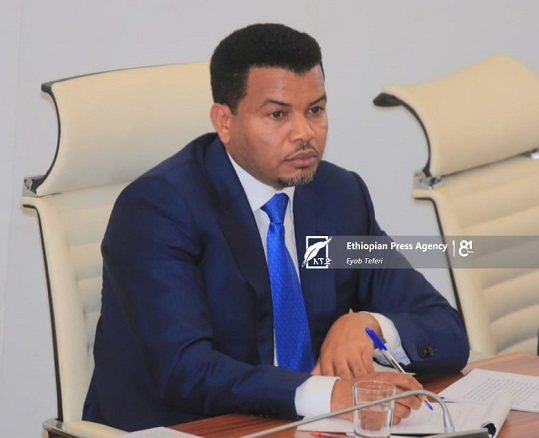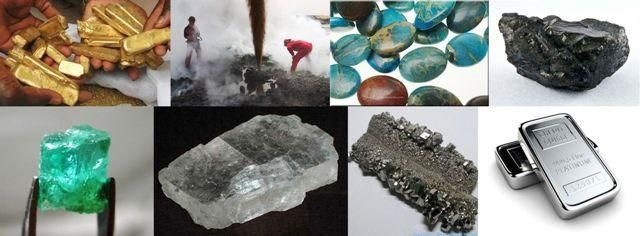
It is known that Ethiopia has not benefited from mining resources due to the complex challenges appearing in the shape of restrictive bureaucracy, lack of effective policies and strategies and others. Following the reform activities that started in April 2018, the mining sector has received greater attention raising hopes for Ethiopia’s development and prosperity.
Mines Minister Eng. Takele Uma while he was briefing MPs on the Ministry’s nine months report indicated that the emphasis attached with the sector has brought visible results.
For instance, in the 2013 Ethiopian fiscal year, the country earned 681 million USD from the mining sector by providing 9,384 kilograms of gold, tantalum, and other minerals to the National Bank of Ethiopia. The Ministry has planned for the 2014 E.C budget year to produce 6,553 kg and 6,947 kg (106 percent of the plan) has been delivered to the National Bank of Ethiopia which helped earn 439.67 million USD. The current gold production surpassed that of the same period last year’s same period by 12 percent, according to him.
Meanwhile, 2,317.05 kg of jewelry minerals (103 percent of the plan) 79 tons of tantalum, 7,363 tons of industry mines, and 2,000 tons of sodium bromide were produced and exported in the reported period. Also, the ministry planned to supply 4.8 million tons of industrial minerals to the domestic market and achieved 4.6 million tons. From its plan to supply 34.515 million cubic meters of construction inputs to the domestic market, the ministry achieved 36.84 million cubic meters, he said.
To attract both local and foreign direct investment in the sector, the government, in the last nine months, has issued 55 licenses, out of which 39 have been mining explorers while 16 of them are mining extractors. Besides, 24 locals and 31 foreign companies are licensed. Over 126,000 jobs have also been created.

The companies are operating across the country, especially; some of them are located in Oromia, Amhara, Benishangul Gumuz, South, South West, Afar, West Ethiopia, and Northeast Ethiopia, Gamblela. Investors from China, Turkey, India, Thailand, UAE, and soon have also seized the opportunity.
Fertilizer is a dearly needed agricultural input that Ethiopia transports to the hinterland suffering the outflow of hard currency. Paradoxically, Ethiopia has abundant mining resources to produce the commodity at home- Ethiopia has calcium phosphate in its western part; sulfur and potash deposits in the northeastern section.
Currently, stock estimates, investment feasibility, and economic feasibility assessments are underway. This will significantly narrow the country’s fertilizer supply gap. The country is also endowed with tantalum that is used for making all electronic devices such as mobile phones, cameras, computers, and so on, he explained.
The availability of mineral resources alone is not enough; it rather needs several tasks to fully benefit from them. The Plan and Development Minister Fitsum Assefa (PhD) said that the country is revising the economic policy; it has also prepared a 10-year economic plan that aims to bring quality-based economic growth and increase production and competitiveness via home-grown economic reform. The mining sector is at the heart of the national plan as well.
In order to utilize the sector, the government is also revising and amending policies, proclamations and strategies. For instance, the Ministry of Mining implemented two projects to ensure the benefits of regional and traditional gold miners. The law, which states Manufacturers’ Associations should stay in one place for two, has been lifted to increase productivity. Moreover, improvements have been made on the price of jewelry by lifting restrictions that had previously been imposed. Strong corrective measures have been taken to ban gold smuggling, he added.
Gold, coal, iron ore, construction materials, potash, tantalum, emeralds, and opal are among the precious minerals that Ethiopia is endowed with. Hence, Ethiopia should bolster export by creating national capabilities and strengthening the mining sector.
The overall efforts of the Ministry of Mines are geared towards encouraging exports, replacing imports with domestic products, and expanding job creation for citizens. It is also imperative to make significant efforts to improve its long-term plan, policies, regulations, and guidelines.
Indeed, the mining sector, having various challenges, is playing a crucial role in supporting the overall economy of the country. It is also contributing to the country’s development, social progress, and economic growth which is imperative to reduce poverty, support livelihood income, and extend alternative forms of development in Ethiopia. Therefore, to successfully leverage its mining sector for economic growth and sustainable development, Ethiopia will have to learn from the experiences and good practices of more mature mining economies and make use of available frameworks and guidelines.
BY EPHREM ANDARGACHEW
The Ethiopian Herald 5 June 2022





